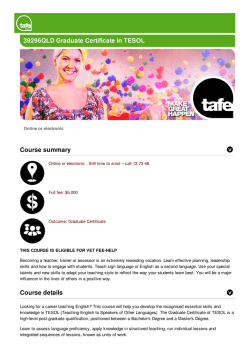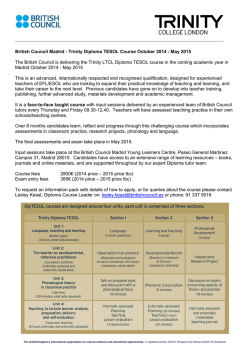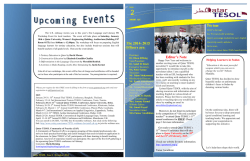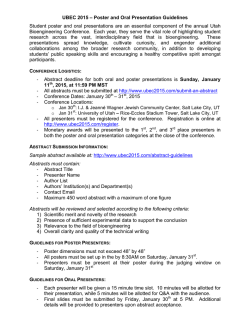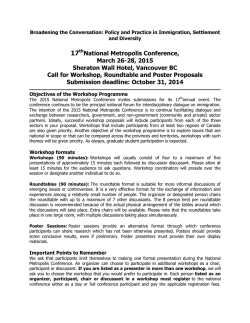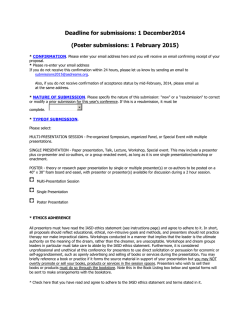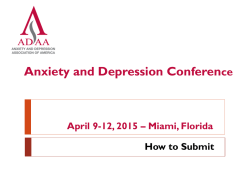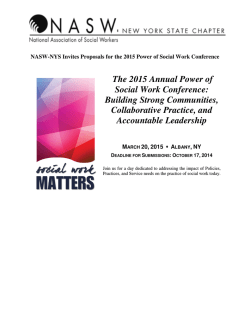
You are invited to the Boston TESOL Party
CALL FOR PARTICIPATION You are invited to present at the TESOL International Convention & English Language Expo 25–28 March 2015 Toronto, Ontario, CANADA TESOL 2015 CONVENTION PLANNING TEAM Ryuko Kubota Convention Program Chair Ayanna Cooper Associate Program Chair John Schmidt Associate Program Chair Shelley Taylor Associate Program Chair TESOL Host Affiliate TESL Ontario Barbara Krukowski Local Cochair Rita Plaskett Local Cochair Antonella Valeo Local Cochair TESOL 2015 Call for Participation p. 2 PROPOSAL DEADLINE Monday, 2 June 2014, 11:59 pm U.S. Eastern Daylight Time. To find the deadline in your time zone, please click here. ELECTRONIC SUBMISSION OF PROPOSALS All proposals must be submitted online through the TESOL website using the Precis Abstract Management System. Faxed or mailed proposals will not be accepted or acknowledged. TESOL INTERNATIONAL ASSOCIATION MISSION AND VALUES Mission The mission of TESOL International Association is to advance professional expertise in English-language teaching and learning for speakers of other languages worldwide. Values professionalism in language education individual language rights accessible, high-quality education collaboration in a global community interaction of research and reflective practice for educational improvement respect for diversity and multiculturalism 2015 TESOL INTERNATIONAL CONVENTION & ENGLISH LANGUAGE EXPO The annual TESOL convention offers English-language teaching (ELT) professionals and scholars from around the globe the premier opportunity for professional development. ELT educators and scholars from 100 countries exchange ideas and practices, enhance their knowledge of a vast range of ELT content areas, keep up with current trends, expand their professional networks, engage in mentoring on research and other projects, review the latest professional publications and resources, and learn about advocacy efforts in their community and around the world. 2015 Convention Theme Crossing Borders, Building Bridges 2015 Convention Vision TESOL International Association embraces multiple specializations, topics of inquiry, geographical areas, and professionals from diverse interests and backgrounds. As the 2015 TESOL International Convention & English Language Expo is literally crossing the national border between the United States and Canada for the first time since 2000, we are also crossing borders to examine multiple differences and challenges that we have, while seeking new opportunities for change. Transformations are made possible not only through crossing borders but also through building bridges. Bridges are passageways that connect the old and the new, multiple experiences, and shifting perspectives. Bridging enables us to traverse differences and reexamine existing borders. TESOL 2015, in the multicultural, multilingual city of Toronto, will provide all participants with invaluable opportunities to reach out to others across various borders to build TESOL 2015 Call for Participation p. 3 multiple bridges of dialogue for new understandings and new community formations. The Venue: Toronto, Ontario, CANADA International ideas and innovations intersect with Canadian culture in Toronto, one of the world’s most cosmopolitan cities. Speaking 140 different languages, more than half of Toronto’s residents were born outside of Canada. The ongoing fusion of cultures continues to enrich Toronto, which local actress Lisa Ray calls, “the most successful social experiment in the world.” Toronto’s skyline is punctuated by the CN Tower, the tallest free-standing structure in the Western Hemisphere, as well as scores of skyscrapers, juxtaposed with historic, century-old limestone buildings. Discover the urban delights of this city of contrast and charm—museums, theaters, sports venues, and endless shops, as well as the vibrant nightlife. Sample Canadian cuisine, which chef Brad Long describes as “the beauty of our natural resources used in this incredibly multicultural way.” Hotelier Jeff Senior adds, “Toronto offers a taste of the world in one town.” Explore Toronto’s neighborhoods, ethnic enclaves bounded by extensive stretches of waterfront, as well as green belts of parks and trails. Begin your visit to Toronto at Toronto Pearson International Airport, where over 70 airlines bring travelers to the city on nonstop or same-plane flights from nearly 50 U.S. airports and from 100 other international destinations. Travelers from the North American Eastern Seaboard or the Great Lakes region can readily reach Toronto by car, bus, or train. However you get there, you’ll understand what Hotelier Jeff Senior means when he says, “When the world comes home, it comes home to Toronto.” INVITATION TO PARTICIPATE Professionals and scholars from all English-language-teaching (ELT) educational contexts worldwide and all related fields and content areas are invited to submit proposals to present at the 2015 TESOL International Convention & English Language Expo. Proposals are refereed by TESOL members who are trained reviewers from the content areas designated on the proposals. ROLES AND RESPONSIBILITIES Each presentation proposal includes one organizer. The organizer may also be a presenter, along with other presenters. The roles and responsibilities are as follows: An organizer/presenter is the main correspondent and will present at the convention. The presenter’s name and institution will appear in the Convention Program Book. The organizer/presenter will communicate in a timely manner with all other presenters about the status of the proposal and other information sent by TESOL. The organizer must also inform TESOL Conference Services when a presenter’s contact information or status changes. Alternately, an organizer/nonpresenter is the main correspondent but will not present at the convention. His or her name will not appear in the Convention Program Book. The organizer/nonpresenter will communicate in a timely manner with all presenters about the status of the proposal and other information sent by TESOL. A presenter will present at the convention. The presenter’s name and institution will appear in the Convention Program Book. TESOL will communicate with organizers about the status of proposals and convention session details. Presenters should remain in contact with organizers and vice versa. TESOL 2015 Call for Participation p. 4 The maximum number of presenters per session, including an organizer/presenter, varies by session type (see Session Type). All organizer/presenters and presenters must register for the convention. (TESOL does not reimburse expenses, i.e., registration, travel, hotel, meals, and audiovisual equipment, etc.). refrain from changing the conceptual content of the session as described in the proposal abstract and description after the proposal has been accepted. Organizer/presenters and presenters are expected to engage the session audience rather than simply reading a scripted presentation. Audiovisual (AV) Equipment TESOL provides an LCD projector, screen, and podium microphone free of charge in each session room. Additional AV equipment is available for a fee set by the audio visual provider. Following acceptance of the proposal, the organizer should order any additional AV equipment needed for the presentation by the specified deadline. No-Shows Every year at our convention, some colleagues who have agreed to present simply do not show up for their presentations. These no-shows waste convention attendees’ valuable professional development time and reflect poorly on the overall quality of the convention program. If extenuating circumstances prevent you from fulfilling your commitment, please contact Lisa L. Dyson, CMP, immediately. If you fail to contact TESOL and you do not show up for your presentation, you cannot submit a proposal for TESOL 2016. TYPES OF SESSIONS Colloquium (1 hour, 45 minutes; 6 presenters max.): A forum for a group of scholars to present and discuss current ELT issues. Presenters exchange papers in advance and discuss positions during the session. The organizer is responsible for recruiting presenters who represent various viewpoints in the field before submitting the proposal. Discussion Group (45 minutes, 3 presenters max.): An opportunity to discuss a hot topic in TESOL within a structured roundtable format. The discussion leader(s) should have a strong knowledge of the designated topic and should include the audience in the discussion. Roundtable Exchange (1 hour, 15 minutes; 2 presenters per proposal max. New format this year—read carefully): An opportunity to share and discuss work in progress or emerging ideas in theory and practice with other presenters and a small audience in an informal roundtable format. Roundtable Exchange allows for stimulating conversations and networking opportunities among participants on shared interests. Individual proposals will be grouped into roundtables clustered around shared topics. Roundtable Exchanges will be held in a large room with several discussions taking place at the same time at different tables. Presentations will be delivered in turn for no more than 15 minutes each, after which presenters will engage in extended discussion with the other attendees at the table. One presenter will volunteer to serve as a timekeeper. No audiovisual equipment will be provided. TESOL 2015 Call for Participation p. 5 Poster Session (1 hour, 15 minutes; 2 presenters max.): A visually explanatory exhibit that allows for short, informal discussion between the presenter(s) and attendees, as attendees circulate within the poster-session area. Poster sessions serve as an important and interactive forum for sharing professional ideas and for receiving feedback. Poster exhibits are set up side by side within the session area during the hour before the session and dismantled within the hour afterward. The poster is mounted on a 4-foot-by-8-foot display board that includes the session title, the name and institutional affiliation of the presenter(s), and very brief text with clearly labeled photos, drawings, graphs, or charts. Presenters are expected to be available for discussion during the entire midday session as attendees circulate among the posters. No AV equipment or electrical access will be available. Detailed guidelines will be sent to accepted presenters. Practice-Oriented Presentation (45 minutes, 3 presenters max.): A session that shows, as well as tells, a technique for teaching or testing. The presenter should spend no more than 10 minutes explaining the underlying theory. Research-Oriented Presentation (45 minutes, 3 presenters max.): An oral summary with occasional reference to notes or a text that discusses the presenters’ topic and work in relation to theory and/or practice. Teaching Tip (20 minutes, 2 presenters max.): Similar in content to a practice-oriented presentation but shorter. The teaching tip session is an oral summary that discusses the presenter’s work in relation to practice. Workshop (1 hour, 45 minutes; 6 presenters max.): A carefully structured, hands-on professional development activity. The presenter(s) and participants tackle a problem or develop specific teaching or research techniques. PROPOSAL EVALUATION CRITERIA Each proposal is reviewed by at least two peer reviewers who are TESOL members representing the TESOL Interest Section that corresponds to the subject of the proposal. Reviewer are trained in the review process. They will not know the names or institutional affiliations of the organizers/presenters, and organizers/presenters will not know the names or institutional affiliations of the reviewers. Proposal reviewers will use the evaluation criteria and scoring rubric below. The maximum proposal score is 25 points. The peer reviewers will have the opportunity to provide comments that will be sent to the proposal submitter. Reviews are referred to the TESOL Interest Section chairs who advise the Convention Program Committee. Comprised of the convention program chair and associate program chairs, this committee works with the TESOL staff to choose the proposals that will appear in the convention program. Proposal Rating Rubric Evaluation Poor Fair Good Very Good Excellent Criteria (1 Point) (2 Points) (3 Points) (4 Points) (5 Points) 1. Currency, The topic is not The topic is only The topic may not be The topic is current, The topic is cutting- importance, current, and/or lacks tangentially related to the completely current or important, and edge, relevant, and appro- importance or field, not completely groundbreaking, but it appropriate to the ground-breaking, or priateness of appropriateness to the current or important to is relevant to the field field and potential significant to the field field. It does not the field and/or to the and potential audience. audience. It appears and potential TESOL 2015 Call for Participation p. 6 topic to the appear to be a potential audience. It It might be a to be a worthwhile audience. It appears field worthwhile may not be a worthwhile worthwhile session. session. to be a very session. session. 2. Purpose, The proposal is The proposal may be The proposal is The proposal is The proposal matches participant inappropriate for the appropriate for the generally appropriate appropriate for the the session type. The outcomes, session type, and/or session type. The for the session type. session type. The objectives and and session the objectives are not objectives and participant The objectives and objectives and participant outcomes type clearly stated or outcomes may be too participant outcomes participant outcomes are very clear. implied. general or broad to be are stated or implied are clear. achievable. but may lack sufficient worthwhile session. focus. 3. Theory, The proposal does not The proposal provides The proposal refers The proposal refers The proposal refers practice, mention theory, background references to somewhat to the clearly to the theory, specifically to the and/or practice, or research, theory, practice, and/or theory, practice, and/or practice, and/or appropriate theory, research or it is unclear how research, but it is not research on which the research on which practice, and/or basis this session is specific, or it does not presentation is based in the presentation is research on which the connected to the field. relate the theory, an understandable way based in a thorough presentation is based practice, and/or research and relates it to the and comprehensible in a detailed, to the content of the content of the manner and relates it thorough, and presentation. presentation. directly to the comprehensible presentation content. manner and relates it directly to the presentation content. 4. Support The proposal makes The proposal makes The proposal gives The proposal The proposal for claims with no some stated or implied some indication as to provides details provides ample practices, indication of the reference to support, but how practices, indicating that the details indicating that conclusions, support for those it is not clear whether conclusions, or practices, the practices, and/or claims. sufficient support will be recommendations will conclusions, or conclusions, or recommen- provided for practices, be substantiated. recommendations recommendations dations conclusions, or will be will be well recommendations. substantiated. substantiated. 5. Clarity of The way in which the The way in which the The proposal is The proposal is The proposal is very proposal as proposal is written proposal is written adequately written but clearly written and well written and indicator of suggests that the suggests that the suggests that the suggests that the suggests that the presentation presentation may be presentation may be presentation may be presentation will be presentation that will quality poor. weak. uneven or of moderate of very good be of professional quality. quality. quality. Total Score: Comments: TESOL 2015 Call for Participation p. 7 Factors Affecting Proposal Selection International TESOL conventions bring together professionals and scholars from around the world working in diverse roles with English language learners of all ages and at all stages of language development. Therefore, an important factor in proposal selection is program balance. Both the TESOL Interest Section leaders and the Convention Program Committee strive to balance the convention program by considering the following: range of topics within the ELT profession relevance to TESOL conferees and to the convention theme number of presentations on the same or similar topics and/or subtopics content-area coverage presenters’ apparent level of expertise professional and geographic distribution of presenters An important factor in proposal evaluation and scoring by reviewers is attention to all five of the criteria in the proposal rating rubric. Abstracts and session descriptions should be clearly and concisely written to convey the session’s significance and its appropriateness to the field and intended audience. Carefully written and edited, they should demonstrate evidence of a high quality of research and/or practice, as applicable, as well as clear evidence that the session will be well organized and presented. Factors Disqualifying a Proposal TESOL does not receive the proposal by the deadline. The proposal is not received electronically. The proposal is incomplete or not completed according to the guidelines in the Call for Participation. The session title, abstract, or description includes the name(s) or institution(s) of organizers or presenters. The same or a similar proposal is submitted to more than one interest section or session type. The presentation promotes commercial interests. PREPARING YOUR PROPOSAL Parts of a Proposal The proposal has three components that are scored by peer reviewers: a 10-word title, a 50-word abstract, and a 300word session description. The title and abstract will appear in the Convention Program Book. Although the session description will not appear in the Convention Program Book, it is carefully read by the reviewers and thus critical to the assessment of the proposal. Title The title should accurately reflect the session content and be clear to the intended audience. The title must not exceed 10 words (each part of a slashed or hyphenated word counts as one word) not include exclamation or quotation marks not include presenters’ names, institutions, or published works TESOL 2015 Call for Participation p. 8 capitalize all verbs, nouns, adjectives, adverbs, and pronouns; conjunctions, articles, or prepositions of fewer than four letters are not to be capitalized capitalize both terms of hyphenated compounds and the first word after a colon Abstract Write the abstract with the proposal rating rubric evaluation criteria in mind. The abstract will be thoroughly examined and scored by peer reviewers. Carefully write, edit, and proofread it. The abstract will appear in the Convention Program Book, so it should be written to reflect the presentation’s quality and content and appeal to its appropriate audience. The session abstract must not exceed 50 words not include presenters’ names, institutions. or published works write out acronym(s) or abbreviation(s) used in the title except the following: L1, L2, CALL, CBI, EAP, EFL, EL, ELL, ELT, ESL, ESP, IEP, NNEST, SLA, TESOL, TESL, and TEFL. Abstracts may be edited by the Convention Program Committee and TESOL staff editors. Session Description Write the session description with the proposal rating rubric evaluation criteria in mind. This description will be thoroughly examined and scored by peer reviewers. It will not be published in the Convention Program Book, but it should be written, edited, and proofread to reflect the overall quality of the proposal. The session description should: include a clearly stated purpose and point of view include supporting details and examples contain evidence of current practices and/or research conform to an appropriate session type (e.g., paper, demonstration) include a variety of techniques (e.g., activities, visuals) indicate an appropriate amount of material for the allotted time reflect the presentation content and format In addition, the session description must not exceed 300 words not include presenters’ names, institutions, or published works write out acronym(s) or abbreviation(s) used in the title except the following: L1, L2, CALL, CBI, EAP, EFL, EL, ELL, ELT, ESL, ESP, IEP, NNEST, SLA, TESOL, TESL, and TEFL. The session description should also include the following information based on the session type: Colloquium: synopsis of issue(s), plan of the presentation and topics (without listing presenters’ names) Discussion Group: overview, topics, and issues Roundtable Exchange: main topics and issues for a short presentation TESOL 2015 Call for Participation p. 9 Poster Session: main topics and description of the visual display Practice-Oriented Presentation: synopsis, including reference to teaching strategies Research-Oriented Presentation: synopsis, including central idea and supporting evidence Teaching Tip: synopsis, including brief description of the teaching tip Workshop: session goals, synopsis of the theoretical framework, and description of workshop tasks and procedure Choosing the Appropriate Interest Section Choose the most appropriate TESOL Interest Section (IS) to review your proposal. All proposals are evaluated by TESOL members who are trained proposal readers working in conjunction with the IS leaders. A proposal submitted to an inappropriate TESOL IS has little chance of acceptance. To determine which IS best corresponds to your proposal, read the following descriptions. Additional information on TESOL ISs may be found on the TESOL website. The TESOL IS designated for each presentation will be noted in the Convention Program Book. Adult Education brings together professionals who represent the knowledge, precepts, and skills of two distinct but compatible areas: adult education and English as a second language. Applied Linguistics explores language learning and communication through the application of theory to real-world contexts. Bilingual Education increases awareness of the role of ESL in bilingual education, encourages research in bilingual education, and works closely with TESOL members and other professionals concerned with bilingual education. Teachers of English to deaf students (TEDS) are included in this interest section. Computer-Assisted Language Learning (CALL) defines issues and standards in CALL, contributes to the computer orientation of other TESOL members, and fosters research into the role of CALL in language learning. Elementary Education fosters recognition of ESOL as an academic discipline in elementary education, increases awareness of elementary ESOL educators’ needs, and develops new professional resources for teachers and their students. English as a Foreign Language exchanges ideas on global and specific EFL/ESL issues, bringing together TESOL members with interests and experiences in different countries, and provides an international network on employment and professional interests worldwide. English for Specific Purposes supports professionals interested in the design and delivery of courses or programs related to specific disciplines such as science, medicine, business, industry, government, and others. Higher Education advances effective instruction, promotes professional standards and practices, influences and supports policies of TESOL and other associations, determines needs, and considers all other matters relevant to ESL in colleges and universities. Intensive English Programs addresses issues related to curriculum design and implementation, assessment, teaching standards, and research relevant to teaching English primarily to nonnative international students attending intensive and semi-intensive programs related to regular academic study. TESOL 2015 Call for Participation p. 10 Intercultural Communication promotes intercultural awareness, respect for all cultures and co-cultures, and increased intercultural competency among TESOL educators and scholars. International Teaching Assistants addresses research, teaching, and administrative issues related to the preparation of international teaching assistants for instructional duties in university classrooms. Materials Writers fosters the production of materials in ESL and EFL by writers, teachers, curriculum planners, administrators, consultants, editors, artists, and designers. Materials may be in print or on tape, film, video, or computer disk. Nonnative English Speakers in TESOL strengthens effective teaching and learning of English around the world while respecting individuals’ language rights. Program Administration recognizes the role program administrators play in fostering professionalism and strengthening managerial and leadership skills through a forum that ensures effective ESL/EFL programs. Refugee Concerns addresses the language, cultural, social, and legal needs (and their interconnections) of refugees at all ages and stages of life. Secondary Schools represents professionals in the area of secondary education whose task is to ensure that secondary-level TESOL students develop the linguistic, cultural, and cognitive skills necessary for success in an English-speaking context. Second Language Writing provides a forum for researchers and educators to discuss research, teaching, and assessment of second language writing in all educational contexts and levels. Social Responsibility comprises TESOL members who are actively engaged in integrating language teaching with social responsibility, world citizenship, and an awareness of global issues such as peace, human rights, and the environment. The interest section aims to promote social responsibility within the TESOL profession and to advance social equity, respect for differences, and multicultural understanding through education. Speech, Pronunciation, and Listening increases awareness of the significance of learning the spoken forms of English through the exchange of practical and theoretical information related to teaching materials, classroom methods, and research. Teacher Education discusses issues relevant to ESL/EFL teacher education, promotes professional development of ESL/EFL teachers, and formulates policy that will improve conditions of employment and learning for teachers and students. Video and Digital Media focuses on the review, production, and use of video and digital materials in English language teaching, including student- and teacher-produced videos, commercially available materials, instruction through movies and television, media literacy, film analysis, intercultural training, video as an assessment tool, teacher education, interactive video, distance learning, and the use of new video-related technology. TESOL 2015 Call for Participation p. 11 Choosing Content Areas In addition to choosing the most appropriate TESOL IS to review your proposal, select up to two relevant content areas from the extensive list below on the proposal worksheet. Proposals will be evaluated by TESOL members who have expressed an expertise in the specific content areas and who are trained proposal readers working in conjunction with the corresponding IS leaders. The content area designated as the primary one will be noted as such in the Convention Program Book. Note that some of the content areas overlap with IS designations; some cover specific subareas within the IS. SUBMITTING YOUR PROPOSAL All session organizers must submit proposals online through the TESOL website using the Précis Abstract Management System. The software system does not allow for entries or changes to entries after the deadline date and time. The submission deadline for proposals is Monday, 2 June 2014, 11:59 pm U.S. Eastern Daylight Time. (To find the deadline in your time zone, click here.) A separate online proposal submission must be completed for each proposed session. Mailed or faxed proposals will be disqualified and not acknowledged. All submissions must adhere to the guidelines in this Call for Participation. If you have questions, email TESOL Conference Services or call the TESOL Staff Office at 1-703-836-0774. Recommended Procedure for Submitting Your Proposal Collect and prepare all submission information well in advance. 1. Draft the proposal using the TESOL 2015 Proposal Worksheet below. 2. Refer to the detailed information and instructions in this Call for Participation. 3. Visit Precis Abstract Management System on the TESOL website. 4. If you are new to the Precis system, you will be asked to create a username and password. Once you do that, you will be able to enter the system to edit your submissions as needed until you are ready to submit. If you have submitted a proposal before, you are already in the system. (Please remember that your Precis login may be different from your TESOL website login.) 5. Follow the Precis instructions to submit your proposal electronically. To avoid possible technical problems, do not wait until the final hours to submit your proposal. (Note: Please do not mail or fax a duplicate copy of your proposal to TESOL.) 6. After successfully submitting the proposal, the session organizer will receive an e-mail message confirming receipt of the submission. The message will contain your proposal number for future reference. Please include this number on all correspondence concerning the proposal. Audiovisual (AV) Equipment TESOL provides a complimentary LCD projector, screen, and podium microphone for all sessions. Additional equipment, including Internet access, may be ordered at the presenters’ expense. After proposals have been accepted, session organizers will be informed about ordering additional AV and computer equipment from the designated equipment vendors. Order forms received after the deadline may not be considered. TESOL 2015 Call for Participation p. 12 AWARDS Presenters at the TESOL International Convention & English Language Expo are eligible for two awards: TESOL Award for an Outstanding Paper on NNEST Issues To be considered for this award, the proposal must be presented by a current TESOL member at the time of application who will remain a member through the 2015 TESOL convention a Practice-Oriented Presentation, Research-Oriented Presentation, or Colloquium reviewed by the Non-Native English Speakers in TESOL Interest Section on a topic relevant to NNEST research and issues original, creative, and relevant, and with broad impact on and contribution to the field be accepted and presented at the 2015 TESOL convention To ensure that the proposal is considered, the organizer must be a current TESOL member at the time of application who will remain a member through the 2015 TESOL convention designate the Non-Native English Speakers in TESOL Interest Section on the proposal submission form check the box indicating eligibility for this award on the proposal form Award recipients will be notified in December 2014. Other applicants will not receive direct correspondence about the status of their award application. The award includes 2015 TESOL Convention registration and an honorarium of US$250. If the awarded session has multiple presenters, all presenters are recognized as having won the award, but the monetary prize is assigned to the organizer. Award for International Participation at TESOL The purpose of this award is to increase participation at TESOL international conventions of presenters based outside of the United States and Canada. Recipients receive up to US$2500 to cover travel and lodging. To apply for this award, session organizers need to check the corresponding Award Eligibility box on the proposal form. All session organizers and presenters must meet the following eligibility requirements: be a current TESOL member at the time of application (verified upon receipt of the application) and maintain current membership status through the 2015 TESOL convention reside in and be a citizen of a nation outside of the United States or Canada be a first-time presenter at the TESOL International Convention & English Language Expo submit a Practice-Oriented Presentation, Research-Oriented Presentation, or a Colloquium To receive the award, the proposal must be accepted and presented at the TESOL 2015 convention. The 2015 Award for International Participation at TESOL winners will be notified of their status in December 2014. Other applicants will not receive direct correspondence about the status of their award application. TESOL 2015 Call for Participation p. 13 STATUS OF PROPOSALS The person designated as the proposal organizer will be notified by email concerning the status of the proposal by the end of October 2014. To ensure that TESOL can communicate with organizers about proposals, they should do the following: Use an e-mail address that will be valid from 2 June 2014 to 30 March 2015. Add [email protected] to your e-mail program address book or to spam white (safe) list. TESOL 2015 PROPOSAL WORKSHEET All proposals must be submitted to the Precis Abstract Management System, an online convention proposal software program. Proposal organizers need to complete the sections below online. To assist in the development of your proposal, the worksheet is formatted to correspond to the order in which the information will be requested during the online submissions process. Presenters All presenters must register for the convention. If presenters are not pre-registered for the convention, accepted sessions may be eliminated from the convention schedule. Indicate the session role for each person involved in the proposal (see Roles and Responsibilities): organizer/presenter organizer/nonpresenter presenter Note: Only one organizer may be designated. The organizer will need the following information for each person in the proposal before submitting the proposal: First Name Last Name Institution Name (Avoid acronyms or abbreviations. Don’t list departments, programs, or centers.) Institution City Institution State/Province Institution Country E-mail Address (Indicate whether TESOL may publish the e-mail address in the Convention Program Book.) Membership Status: Member, Nonmember (This information is not used during the review process and will not affect the status of the proposal.) Session Role: Organizer/Presenter Organizer/Nonpresenter Presenter First-Time Presenter? Yes, No TESOL 2015 Call for Participation p. 14 Consider this person for Award for International Participation at TESOL? Yes, No (See eligibility requirements under “Award for International Participation.”) The organizer will be notified by email concerning the status of the proposal by the end of October. To ensure that TESOL can communicate with the organizer about the proposal: Use an e-mail address that will be valid from 2 June 2014 to 30 March 2015. Add [email protected] to your e-mail program’s address book or your spam white (safe) list. Title of Proposal (10-word maximum): Type of Session (check one box only) Colloquium (1 hr., 45 min.) Discussion Group (45 min.) Roundtable Exchange (1 hr. 15 min) Teaching Tips (20 min.) Poster Session (1 hr.15 min.) Practice-Oriented Presentation (45 min.) Research-Oriented Presentation (45 min.) Workshop (1 hr. 45 min.) Interest Section Check the one (1) TESOL Interest Section to review and assess your proposal. (See “Choosing the Appropriate Interest Section.”) Adult Education Applied Linguistics Bilingual Education Computer-Assisted Language Learning Elementary Education English as a Foreign Language English for Specific Purposes Higher Education Intensive English Programs Intercultural Communication International Teaching Assistants Materials Writers Nonnative English Speakers in TESOL Program Administration Refugee Concerns Secondary Schools Second Language Writing Social Responsibility Speech, Pronunciation, and Listening Teacher Education TESOL 2015 Call for Participation p. 15 Video and Digital Media Content-Areas Choose one (1) primary content area to be printed in the Convention Program Book and no more than two (2) secondary content areas that most closely relates to your proposal topic in the drop down boxes: Accreditation/Certification/Credentialing Adult Education Advocacy Applied Linguistics Arts Assessment/Testing Bilingual Education Business and Vocational Workplace English CALL/Computer-Assisted Language Learning/Technology in Education Community College and Technical Education Content-Based and CLIL/Content and Language Integrated Learning Culture Discourse and Pragmatics Distance Learning/Online Learning Educational Linguistics Elementary School/Primary Education English as a Foreign Language English for Specific Purposes Grammar Higher Education High School/Secondary Education Integrated Skills Intensive English Programs Intercultural Communication International Teaching Assistants Language Policy and Planning Leadership Learning Disabilities/Special Needs Listening, Speaking/Speech Mainstream Classrooms Materials Writers, Curriculum/Materials Development Math and Science Media (Print, Broadcast, Video, and Digital) Middle School/Preparatory Education Nonnative English Speakers in TESOL Personal and Professional Development for Teachers Phonology/Pronunciation Program Administration Psycholinguistics and Neurolinguistics in TESOL Reading and Literacy TESOL 2015 Call for Participation p. 16 Refugee Concerns Research/Research Methodology Second Language Acquisition Second Language Writing/Composition Social Responsibility/Sociopolitical Concerns Social Science Sociolinguistics Standards, Common Core State Standards Task-Based, Project-Based Instruction Teacher Education Teaching Methodology and Strategy Vocabulary/Lexicon World Englishes Targeted Instructional Level(s) (check no more than 2 boxes): Preschool Elementary School Middle School High School Higher Education [undergraduate, (post)graduate, IEP] Community College Adult Education Estimated number of participants likely to attend proposed session 50 or fewer 51–99 100–250 250–450 This information will be used to allocate an appropriate-size room. Will any presenters need Internet access? Yes No Will any presenters refer to books published by TESOL Press or other TESOL Press publications? Yes No If yes, please provide the publication title(s): Abstract for Convention Program Book (50-word maximum) As you draft the abstract, refer to the Proposal Rating Rubric. Session Description (300-word maximum) As you draft the session description, refer to the Proposal Rating Rubric. The description will not appear in the Convention Program Book but will be evaluated by the peer reviewers.
© Copyright 2026
